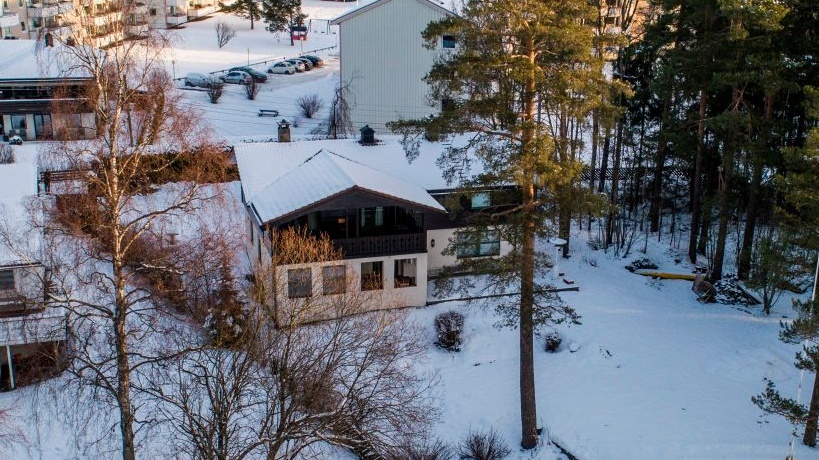What happened to Anne-Elisabeth Falkevik Hagen?
One of Norway’s richest men arrested over mystery disappearance of his wife

A free daily email with the biggest news stories of the day – and the best features from TheWeek.com
You are now subscribed
Your newsletter sign-up was successful
One of the richest men in Norway has been arrested on suspicion of murdering his wife.
Anne-Elisabeth Falkevik Hagen, 69, wife of millionaire property and energy magnate Tom Hagen, vanished from their home in Lorenskog, east of Oslo, in October 2018. They had been married for 49 years, having been childhood sweethearts.
Police first thought she had been abducted and in January 2019 said a ransom demand had been received for her release.
The Week
Escape your echo chamber. Get the facts behind the news, plus analysis from multiple perspectives.

Sign up for The Week's Free Newsletters
From our morning news briefing to a weekly Good News Newsletter, get the best of The Week delivered directly to your inbox.
From our morning news briefing to a weekly Good News Newsletter, get the best of The Week delivered directly to your inbox.
The BBC reports that the case has “gripped Norway, where kidnappings and murders are relatively rare”.
What happened?
In 2019, shortly after Falkevik Hagen disappeared, police said a ransom had been issued for her return.
Police did not disclose the amount demanded, but according to the BBC, Norwegian media revealed that it was for $10m (£8m) to be paid in the cryptocurrency monero.
A free daily email with the biggest news stories of the day – and the best features from TheWeek.com
Then, in June last year, police changed tack, saying that the case could in fact be murder.
Officers said there was “no sign that Ms Falkevik Hagen was still alive and no contact with the alleged kidnappers”. They added that they could not exclude a “staged kidnapping to hide [the murder]”, Sky News says.
Police arrested Falkevik Hagen’s husband Tom yesterday on his way to work, The Times reports.
Tommy Broeske, who is leading the police investigation, said: “The case is characterised by a clearly planned deception. As other hypotheses have been weakened, suspicions against Tom Hagen have gradually been strengthened.
“There was no kidnapping, no real negotiating counterpart or real negotiations. There are indications of a will to sidetrack [investigators].”
Prosecutor Aase Kjustad Eriksson added: “After now 18 months of investigation, police have come to a point where it has reason to suspect Tom Hagen of murder or conspiracy for murder.”
Hagen’s lawyer, Svein Holden, said his client “strongly maintains that he has nothing to do with this”.
The 70-year-old will appear in court later today but may not be charged until later in the legal process, a normal procedure in Norway.
–––––––––––––––––––––––––––––––For a round-up of the most important stories from around the world - and a concise, refreshing and balanced take on the week’s news agenda - try The Week magazine. Start your trial subscription today –––––––––––––––––––––––––––––––
Who is Tom Hagen?
According to Norwegian business magazine Kapital, Hagen’s fortune is about 1.9bn kroner (£150m), making him Norway’s 164th richest man.
He made his money from Elkraft AS, an electricity supplier he co-founded in 1992, and property development. The Daily Mail reports that he currently holds a 70% stake in the firm, which operates throughout Scandinavia.
The paper adds that a pre-nuptial agreement made in 1987 shows that Falkevik Hagen was entitled to just “£15,000 of his £156m fortune along with a plot of land and a Citroen car if the couple divorced”.
The agreement was also amended in 1993, the Mail notes, “to give Tom Hagen control over a property that Anne-Elisabeth had inherited from her parents”.
However, the contract may not have stood up in court, with lawyers telling the paper that the “agreement was so lopsided it might have been ‘ripped apart’”.
“I have seen many marriages through my practice, but rarely seen a marriage that appears so unbalanced,” one lawyer said. Another added: “If she had tried to challenge this marriage agreement as part of a request for divorce, her husband would have been ripped apart by a court.”
-
 How the FCC’s ‘equal time’ rule works
How the FCC’s ‘equal time’ rule worksIn the Spotlight The law is at the heart of the Colbert-CBS conflict
-
 What is the endgame in the DHS shutdown?
What is the endgame in the DHS shutdown?Today’s Big Question Democrats want to rein in ICE’s immigration crackdown
-
 ‘Poor time management isn’t just an inconvenience’
‘Poor time management isn’t just an inconvenience’Instant Opinion Opinion, comment and editorials of the day
-
 Ex-Illinois deputy gets 20 years for Massey murder
Ex-Illinois deputy gets 20 years for Massey murderSpeed Read Sean Grayson was sentenced for the 2024 killing of Sonya Massey
-
 Why have homicide rates reportedly plummeted in the last year?
Why have homicide rates reportedly plummeted in the last year?Today’s Big Question There could be more to the story than politics
-
 How the Bondi massacre unfolded
How the Bondi massacre unfoldedIn Depth Deadly terrorist attack during Hanukkah celebration in Sydney prompts review of Australia’s gun control laws and reckoning over global rise in antisemitism
-
 Australian woman found guilty of mushroom murders
Australian woman found guilty of mushroom murdersspeed read Erin Patterson murdered three of her ex-husband's relatives by serving them toxic death cap mushrooms
-
 Crime: Why murder rates are plummeting
Crime: Why murder rates are plummetingFeature Despite public fears, murder rates have dropped nationwide for the third year in a row
-
 The missed opportunities to save Sara Sharif
The missed opportunities to save Sara SharifTalking Point After each horrific child abuse case, we hear that lessons will be learnt. What is still missing?
-
 Haitian gangs massacre hundreds accused of 'witchcraft'
Haitian gangs massacre hundreds accused of 'witchcraft'Under the Radar Vodou practices blamed for gang leader's son's illness, as elderly are hacked to death in Port au Prince
-
 Penny acquitted in NYC subway choking death
Penny acquitted in NYC subway choking deathSpeed Read Daniel Penny was found not guilty of homicide in the 2023 choking death of Jordan Neely